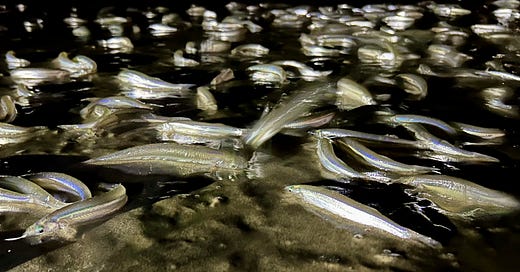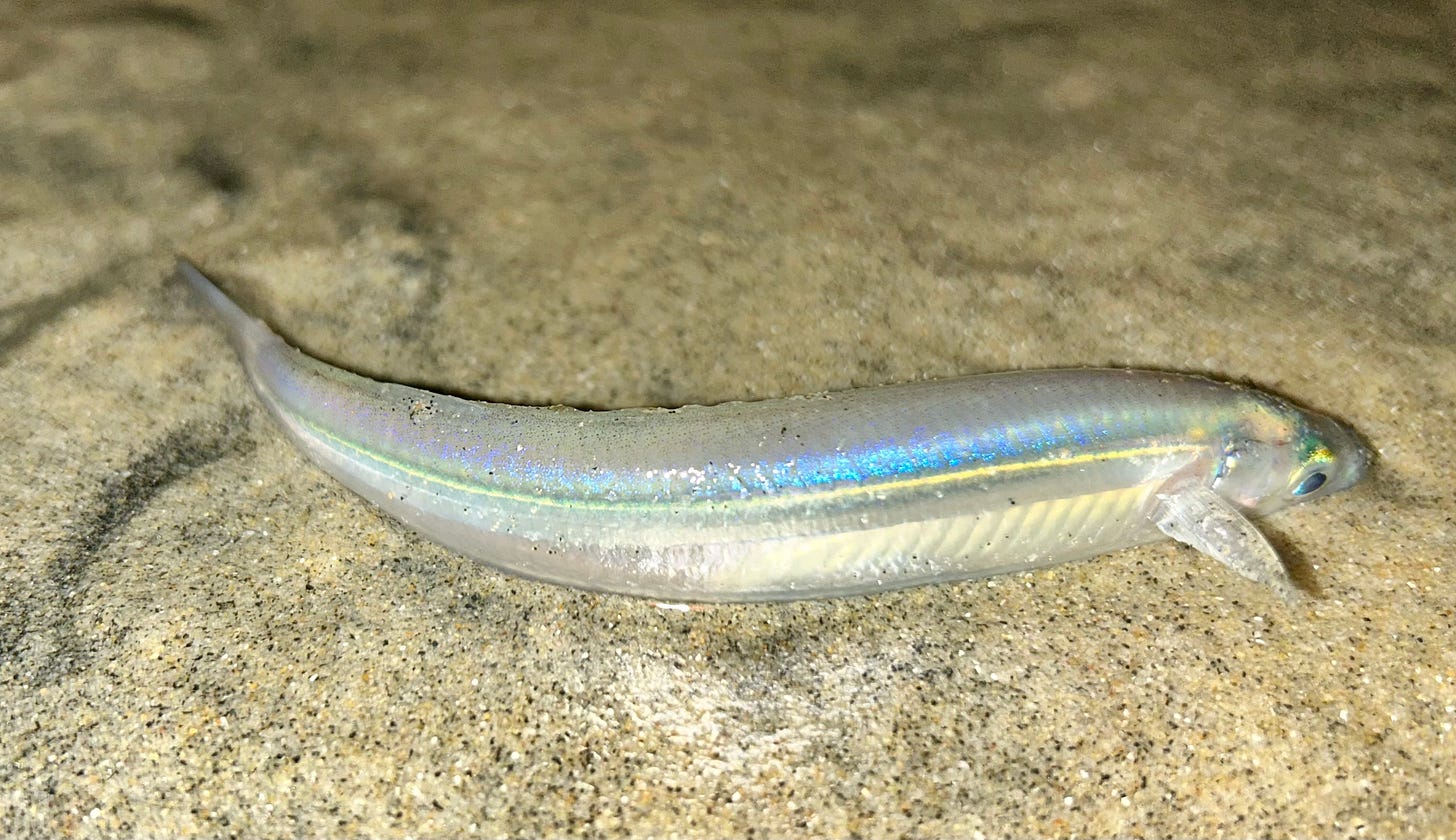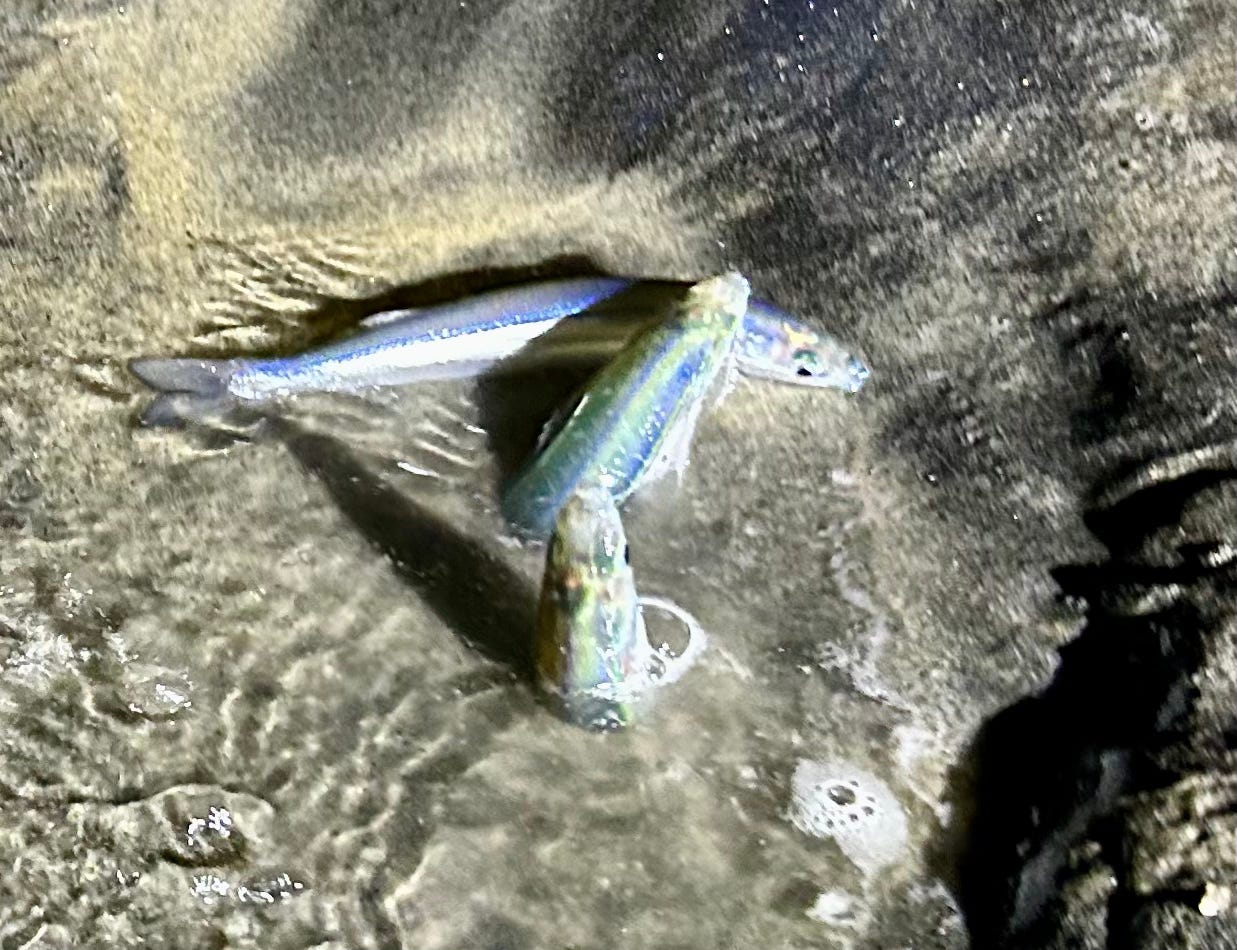Courtesy of petrochemical-powered jet engines and some spiffy aeronautical engineering, we took flight from our native habitat in the green creases of western Oregon and touched down in the Mediterranean climate of San Diego for a family reunion on Kim’s side. There isn’t much that I like about flying. But 500 miles per hour is a speedy way to get somewhere, even traveling through San Francisco, a route I swore off many years ago. Infrequent flier miles and an aging brain caused me to forget that not-so-solemn oath. The delays were all that was needed for our wet country karma to catch up—rain fell steadily for most of our first day at the beach house.
Hanging with Kim’s family was terrific, and I had no illusions that this trip had anything else in store. Expectations aside, her brother and his wife have lived here their entire lives. They know things. And Judy knew that the grunion would run during our visit. The what? The grunion, a toothless fish about five inches long that schools up and willingly hurls itself onto the beach with thousands of its compatriots in a spawning frenzy during spring high tides. The run was supposed to begin at 10:30pm, way too late for someone who needs their beauty rest as badly as I do. But seeing this spectacle had the makings of a quest. I was all in.
The rain stopped at dark. The storm stilled itself to an easy onshore breeze gentling over roaring breakers. A moonless black curtain of sky was stretched across the ocean horizon and covered with a grit of stars. We five intrepid grunion seekers found our way from the pier where we were staying onto wet beach sand. Pulses of saltwater flattened onto the beach, sending us pattering like shorebirds toward the seawall erected to protect the human-built world that stretched inland. Given the predictability of grunion runs, I expected seekers by the hundreds, even thousands, to arrive from the nearby city and descend onto the sand, lights in hand, anxiously awaiting the carnal spectacle of small fish striving for sex on the dark beach. There was no one.
A single grunion skittered across a thin film of water in front of my daughter Laurel and me. Like a life-listing birdwatcher checking off a new species, I could have quit right there. This would have been a mistake. Further ahead another wave withdrew, and hundreds of grunion allowed the water to retreat without them, leaving them thrashing on the glisten of exposed sand. Small silvery knives of fish squirmed everywhere. Most of them flipped frantically back toward the receding water, apparently well aware of the limitations of life as a fish. An aquatic gill-breathing animal can tempt fate and leave the water for only a few minutes. Staying too long carries the certainty of death, and not from old age. I was frantic, too—for a picture of a fish that would hold still long enough. Finally, there it was. Sterling flanks bordered above by a thin yellow stripe followed with another band of turquoise giving way to a back as steely gray as the Pacific Ocean.
Salmon-centric people like myself would call the exquisite grunion a baitfish, a demeaning name that suggests they have no function worthier than catching real fish like tuna who can become steaks sizzling on the grill. In this case, my ignorance is partly excused by biogeography. Grunion hatch, grow, and spawn in the coastal waters of southern California and Baja, far from my home in Oregon. Evolution has fine-tuned their spawning runs to coincide with nighttime spring tides, a pattern so predictable that their frenzied appearance can be known years in advance. They are one of only a few fish species that leave the water to spawn. We found females tail down, half buried in the sand, while expectant males hovered around waiting to fertilize her buried treasure of eggs with a shot of milt.
The fertile orbs will be stranded at the high tide line where they are dependent on moist sand to keep them hydrated. Over a thousand eggs per female would hatch in 12 days, timed to the next high tide. The embryos are stimulated to emerge by the vibration of incoming water, which flushes them unceremoniously out sea. Tonight there were hundreds of other grunion not actively engaged in mating. Instead, they flipped and shivered themselves resolutely back toward the water, knowing instinctively that their blood-filled gills must soon be bathed by another wave of seawater. When the wave came and retreated, the sand was swept clean of fish. I was inundated by an alphabet soup of adjectives. Astonished. Bedazzled. Captivated. Dumbfounded. Entranced. Fascinated. Gobsmacked.
Hungry. Oh yes. I wanted to eat some of them. Like the gulls that rowed the air above the beach, ghosting over us in the dimly lit edges of our flashlight beams. Like the Black-crowned Night Heron standing still as a post at the high tide line. Like all the other predators swimming unseen in the churning water beyond the beach. But this time I didn’t have permission. We were only spectators, a tribe of well-fed tetrapods with bipedal gait and binocular daytime vision and brains large enough to invent artificial light.
I noticed a few other lights up the beach and walked resolutely toward them. I expected to encounter people with buckets, wanted to chat up some grunion catchers intent on participating in this Ides of March ceremony on a more basic level. I had questions. How long have you been catching them? Are you part of a lineage of grunion eaters? How do you cook them? When I reached them, I found they were bucketless. Like us, they were here only to watch this unfettered wildness happening along a narrow band of land rising abruptly to an overbuilt and domesticated world.
I suppose domestication was an answer to my next thought. Why on this beach at the edge of a big city were there not scores of people intent on taking in this silent but ferocious ode to fecundity? Indigenous middens thousands of years old contain tiny otoliths, the ear bones, of grunion, a testament to the ancient life-sustaining value of these lanceolate bundles of protein and fat. I love a good fish-and-chips place as much as the next piscivore. But the ongoing disconnect between people and their food that accompanies our tamed down existence makes me a little sad, even though it means that more grunion will be left unmolested in their death-defying efforts to make more grunion. I am a champion of unresolved cognitive dissonance.
I’m also left to plumb the depths of my own predatory inclinations. There are millions of omnivorous years connecting me to my ancestors. But for the moment I’m thinking in more immediate terms. The old adage you are what you eat is true on all levels—literal, metaphorical, physical, and spiritual. I grew up in a hunting, fishing, and food-growing family and am grateful beyond measure for the lives of all the plants and animals that have built the bone and muscle that has carried me around on this living death-filled planet. I especially appreciate the wildness that lives on in me, even in these fingers typing keys that fill a screen with bytes and phosphors. That part of me that wants to find a bucket, feel the squirm of grunion in my hands, and retreat to the sizzle of a skillet.
Nevertheless, tonight the grunion are safe from me. California law says that without a fishing license I am forbidden from interacting with them in any way. But like the fading margin of our artificial lights, the sharp edges around rules often soften into guidelines. I spotted a lone grunion stranded particularly far up on the beach. The evolutionary biologist in me knows that it likely ended up there because of a poor decision and should be expunged from the gene pool. Even so, my hand formed a scoop fashioned from flesh and bone. I slid it beneath the small fish. Felt the throb of flanks silvering my palm. The granular polish of wet sand. And with a quick flick I sent that flashing candle out into the foamy retreat of water.







Grunion! The word alone sounds like a character in a fantasy novel. Now you have me all curious. Did you know there are Grunion Greeters? https://www.grunion.org/ Favorite phrases in your transportive piece: "grit of stars" "pattering like seabirds" "well-fed tetrapods" and your last sentence. I appreciate the shift to pondering our relationship to our food, to be bucket or bucketless while shops sell fish and chips. I know I'd be bucketless, spellbound. How to be in this world as an omnivore in relationship to our food? Thank you for my morning contemplation.
Best travelogue I ever read! Felt like I was right there with you. You really are an amazing writer, Tom! Hugs to you and Kim.